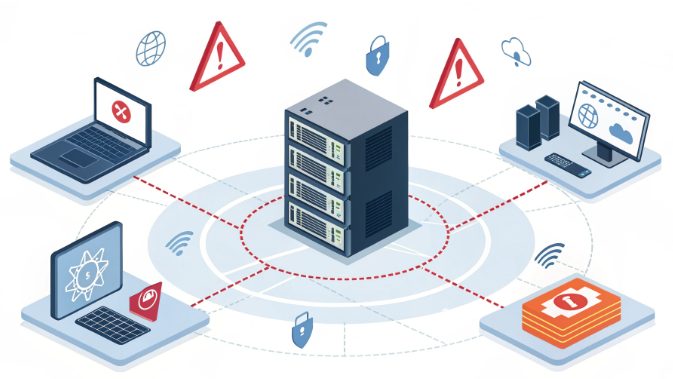DNS Poisoning: Detection & Hong Kong Hosting Solutions

DNS poisoning represents one of the most sophisticated cyber threats in today’s digital landscape. As network security becomes increasingly critical for tech professionals and system administrators, understanding DNS poisoning symptoms and implementing robust Hong Kong hosting solutions has become essential for maintaining secure, high-performance web services. In an era where cyber attacks are becoming increasingly sophisticated, DNS poisoning stands out as a particularly insidious threat, capable of compromising entire networks while remaining largely invisible to end users.
Understanding DNS Poisoning Manifestations
DNS poisoning, also known as DNS spoofing, occurs when DNS resolvers cache falsified DNS records. This manipulation can lead to severe consequences for your web infrastructure and user experience. The attack vector typically exploits vulnerabilities in the DNS protocol itself, allowing malicious actors to inject corrupt DNS data into a resolver’s cache. When this occurs, legitimate DNS queries are answered with fraudulent information, effectively redirecting users to potentially harmful destinations. The complexity of modern DNS infrastructure makes these attacks particularly challenging to detect and mitigate without proper monitoring systems in place.
- Invalid DNS resolution responses, where queries return unexpected or malicious IP addresses
- Unexpected website redirections that can lead users to phishing sites or malware distribution points
- HTTPS certificate validation errors indicating potential man-in-the-middle attacks
- Inconsistent DNS query results across different geographic locations or DNS servers
Technical Detection Methods
Implementing systematic detection protocols is crucial for identifying DNS poisoning attacks. Modern detection systems must employ multiple verification layers and continuous monitoring to ensure DNS integrity. The complexity of DNS infrastructure requires a comprehensive approach to detection, combining both automated tools and manual verification processes. Regular auditing of DNS responses and maintaining detailed logs of resolution patterns can provide early warning signs of potential poisoning attempts.
- Execute cross-regional DNS resolution tests using different DNS servers, implementing automated comparison algorithms to detect discrepancies
- Implement continuous ping monitoring with timing analysis, establishing baseline performance metrics and alert thresholds
- Perform detailed traceroute analysis to identify routing anomalies and unexpected network paths
- Deploy DNS response validation mechanisms using cryptographic verification and signature checking
Impact Analysis on Technical Infrastructure
DNS poisoning can severely compromise your technical stack in multiple ways. The cascading effects of it can ripple through an entire network infrastructure, affecting everything from basic web services to complex microservice architectures. Understanding these impacts is crucial for developing effective mitigation strategies and recovery plans. Modern web applications, particularly those built on microservice architectures, are especially vulnerable to DNS-related disruptions.
- Degraded API endpoint accessibility leading to service interruptions and failed requests
- Compromised SSL/TLS security layers resulting in potential data exposure
- Increased latency in service requests affecting user experience and system performance
- Disrupted microservice communication causing system-wide failures
Advanced Mitigation Strategies
Implementing robust security measures requires a multi-layered approach. Modern DNS security demands a comprehensive strategy that combines traditional security measures with emerging technologies. The implementation of these strategies should be tailored to your specific infrastructure requirements while maintaining flexibility for future security enhancements. Regular security audits and updates to these systems ensure continued effectiveness against evolving threats.
- Deploy DNSSEC validation protocols with regular key rotation and monitoring
- Implement DNS-over-HTTPS (DoH) or DNS-over-TLS (DoT) with proper certificate management
- Utilize automated DNS health monitoring systems with real-time alerting capabilities
- Establish fallback DNS resolution pathways with geographic distribution
Hong Kong Hosting Advantages for DNS Security
Hong Kong’s strategic position offers unique advantages for maintaining DNS integrity. The region’s advanced digital infrastructure and strategic location make it an ideal hub for DNS security operations. Hong Kong’s network infrastructure benefits from significant investment in security technologies and maintains high standards of operational excellence. The combination of modern infrastructure and strategic location provides optimal conditions for secure DNS operations.
- Direct access to major Asian internet exchanges with redundant connectivity options
- Low-latency connectivity to global DNS infrastructure through optimized routing
- Advanced network security implementations with regular security audits
- Robust physical and virtual security measures exceeding international standards
Technical Considerations for Hong Kong Server Selection
When selecting Hong Kong hosting solutions, consider these technical specifications. The choice of hosting provider significantly impacts your ability to maintain secure and efficient DNS operations. Evaluation criteria should include both technical capabilities and operational considerations. Regular assessment of these factors ensures continued alignment with security and performance requirements.
- Network backbone capacity and redundancy with guaranteed uptime SLAs
- DDoS mitigation capabilities including volumetric attack protection
- DNS failover mechanisms with automated switchover protocols
- Cross-datacenter synchronization options for distributed systems
Implementation Best Practices
Optimize your deployment with these technical recommendations. Successful implementation requires careful planning and continuous monitoring of system performance. Regular review and updates of these practices ensure their effectiveness against emerging threats. Documentation and staff training are crucial components of a successful implementation strategy.
- Configure anycast DNS architecture with global server distribution
- Implement DNS monitoring with real-time alerts and response protocols
- Deploy recursive DNS resolvers with caching optimization strategies
- Establish DNS-level traffic filtering with adaptive rule sets
Understanding and addressing DNS poisoning through robust Hong Kong hosting solutions represents a critical aspect of modern network security. By implementing comprehensive detection methods and leveraging the strategic advantages of Hong Kong’s infrastructure, organizations can significantly enhance their DNS security posture and maintain optimal service delivery. The evolving nature of DNS threats requires constant vigilance and regular updates to security protocols, making Hong Kong’s advanced hosting infrastructure an increasingly valuable asset in the fight against DNS poisoning attacks.

